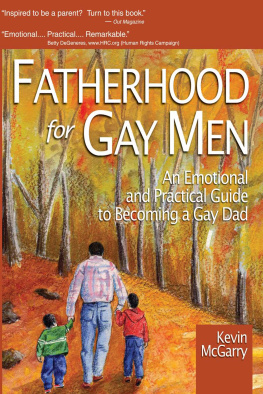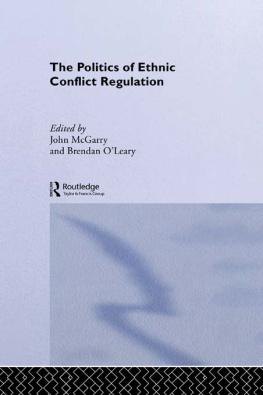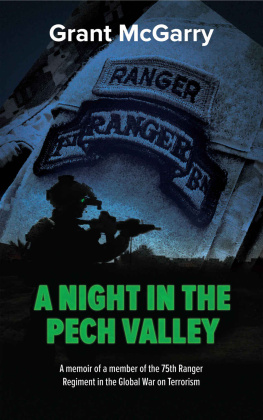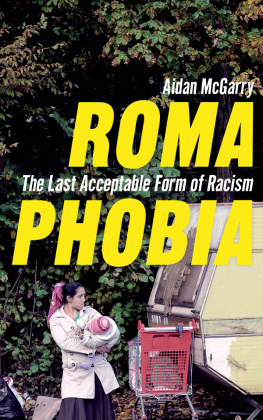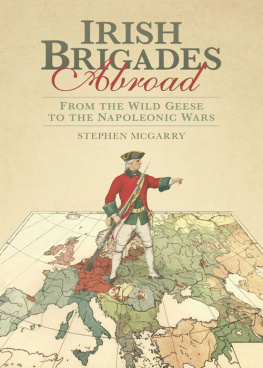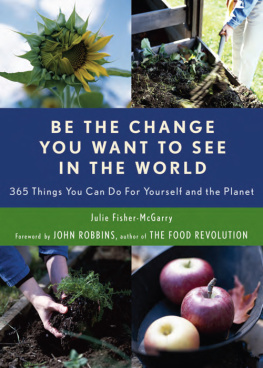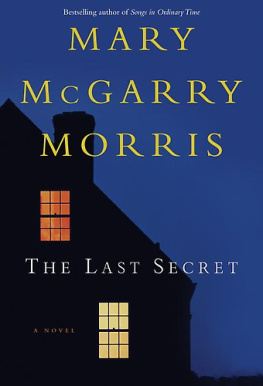Fatherhood for Gay Men
An Emotional and Practical Guide to Becoming a Gay Dad
Fatherhood for Gay Men
An Emotional and Practical Guide to Becoming a Gay Dad
Kevin McGarry
First published by
Harrington Park Press, an imprint of The Haworth Press, Inc., 10 Alice Street, Binghamton, NY 139041580.
This edition published 2012 by Routledge
Routledge
Taylor & Francis Group
711 Third Avenue
New York, NY 10017
Routledge
Taylor & Francis Group
2 Park Square, Milton Park
Abingdon, Oxon OX14 4RN
2003 by The Haworth Press, Inc. All rights reserved. No part of this work may be reproduced or utilized in any form or by any means, electronic or mechanical, including photocopying, microfilm, and recording, or by any information storage and retrieval system, without permission in writing from the publisher.
TR: 8.21.03
Cover painting by Laureen E. McGarry.
Cover design by Lora Wiggins.
Library of Congress Cataloging-in-Publication Data
McGarry, K. P.
Fatherhood for gay men : an emotional and practical guide to becoming a gay dad / Kevin McGarry.
p. cm.
ISBN 1-56023-387-7 (hardcover : alk. paper) ISBN 1-56023-388-5 (softcover : alk. paper)
1. Gay fathers. 2. Gay adoption. 3. McGarry, K. P. I. Title.
HQ76.13 .M343 2003
306.874'2dc21
2002012133
This book is dedicated to Kevin Lee Johnson.
When you spoke of your dreams of adopting a child, you always said when, not if.
Kevin, you would have been a great father.
About the Author
Kevin McGarry, an accountant by trade, is also the author of Anticipating Andrew, a short story of his first meeting with the older of his two adopted sons.
The first time I heard of the Gayby Boom was in 1990 at a millennium panel of the American Psychological Association, predicting sociological trends and the mental health needs for the gay community of the next decade and into the future. Lesbians had already been having babies and creating families, and gay men were in the midst of the AIDS crisis and talk of babies seemed far-reaching. Since that time, the gay community has evolved in significant ways. The community as a whole has made great strides in coming out of the closet and being more visible throughout society. Our political presence is now felt nationally and gay issues are becoming commonplace throughout mainstream culture and the media. As more individuals have become empowered by living lives out in the open, the number of gay men who have decided to become fathers is increasing. Although still only a small subsection of the gay community, their presence is growing. More young gay men today are considering parenthood and have begun to think of having children as a viable option. The publication of this volume is timely as it meets an emerging need within the gay community. Its day has come.
This book is both a touching personal account and a valuable, pragmatic, how-to guide for those gay men considering adoption. The memoirs are filled with emotion and convey the struggles for one man, who single-handedly has been able to make his dream of fatherhood come to reality. The book also provides a comprehensive outline of how one can move through the adoption process, providing useful tips and helpful information to consider. The author is a very grounded individual and speaks with a voice that is psychologically sophisticated, offering his readers sound and wise advice. When I adopted my son in 1996 there were very few gay men to turn to as a role model, so at the time I felt a bit like a gay pioneer. I would have wished for a book such as this one to help guide me through the process of considering parenthood and adoption. Mr. McGarry has captured the essence of being a father and is a wonderful role model for any gay man considering parenthood.
Gordon Cohen, PsyD
Clinical Psychologist;
Co-Director, Affirmative Psychotherapy Group,
Washington, DC
Why dont I have two daddies? asked my son Andy one day, while we were talking about a friend of his who has two dads. If, as they say, truth comes from the mouths of babes, Andys innocent question was a comment on a new world for families. Andys concept of families at age four is that some have two daddies or two mommies, some have one daddy or one mommy, and some have a daddy and a mommy. His perception of family is already the way I envisioned it would bethat each is unique. I see this as a gift from which hell benefit rather than a burden he will have to bear.
I have adopted two Vietnamese boys, Andrew and Vincent. This book is the story of my emotional journey to fatherhood. It is also a practical guide for gay men who are considering parenthood, whether single or partnered. I wrote it for two reasons: first, to encourage gay men who might have parental instincts to take the risks (and enjoy the rewards) involved with adoption and, second, because I have seen many children in need of good homes. As you will see in the following pages, matching parent with child and processing the related paperwork seems simple compared to what I went through emotionally in making the decision to adopteven for the second time. It is my hope that this book will assist gay men in their pursuit of fatherhood and, most important, a few more children in need will grow up in loving homes.
Special thanks to Paul Albergo, Lisa Bennett, Gordon Cohen, Gillian Dunne, John Edwards, Michael Gordon, Patrick Kanary, David Leary, Laureen McGarry, and John Parkhurst for your assistance, inspiration, and encouragement. This book would have been utterly incomplete without each of you.
Andrew and I were on a five-hour flight to Las Vegas the day he turned twenty-two months old. It was our first plane trip since our flight from Vietnam seventeen months earlier. The plane was completely full; we had one aisle seat for the two of us. About an hour before the plane landed, an elderly woman who had been sitting in the row behind us approached me and said she admired how I cared for my son. I thanked her, and she responded that fathersroles sure have changed since she raised her children. I wondered What was I doing that would make a total stranger comment on my parenting skills? Whatever it was, her generous words were encouraging. This kind of encouragement, even well after adopting, helps me affirm my place as a father. I constantly feel privileged and lucky to be a dad, although, as the title of this chapter suggests, it took me a while to get there. My path to fatherhood was as emotionally difficult as had been my coming out as a gay man many years earlier. In my heart I knew I was a natural dad, but intellectually I had to convince myself that I could do it. I believe the gut feelings we all have are a window into the way in which we really want to live our lives, but we are often restrained by societal or familial pressures. We take risks by coming out of the closet as gay men, and at the end of the day, we are emotionally happier because we took those risks. By coming out, we are being true to who we are. The same goes for anyone, gay or straight, who has gut instincts for parenthood. I knew over the years that I had parenting instincts because I had this incredible envy of other dads. I would watch them with their kids and wish that somehow I could have that role. It was painful at times because, being gay, I didnt think parenting was in my life plan. Had more role models been available to me, the process would have been a little less difficultthe closet door would have opened easier this time.



